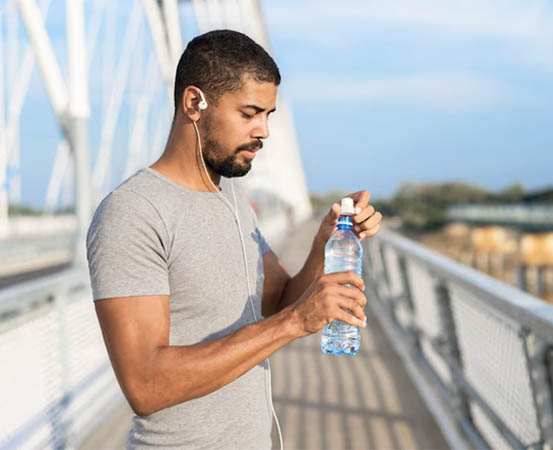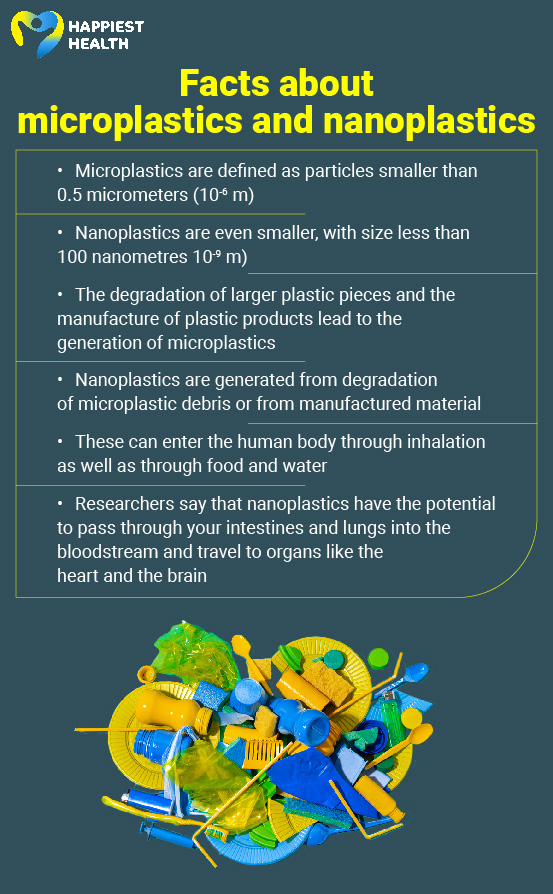
When you’re out and about, quenching your thirst by drinking from a plastic bottle of packaged drinking water can seem commonplace. However, did you know that the seemingly clean and crystal-clear drinking water bottle holding a liter of water can have 110,000 to 370,000 plastic particles? Of this, 90% are nanoplastics, while the rest are microplastics, a new study has found.
The study, conducted by researchers at the Columbia University Lamont-Doherty Earth Observatory, Columbia University and Columbia Mailman School of Public Health, was published in Proceedings of the National Academy of Sciences in 2024. It analyzed samples from three popular brands of bottled water from the United States and revealed that on an average, one liter of bottled water contained 240,000 detectable plastic particles, of which 90% are nanoplastics. According to the researchers, this is 10 to 100 times greater than previous estimates.
Authors of the study have said that nanoplastics have the potential to “pass through the intestines and lungs directly into the bloodstream and travel from there to organs including the heart and brain.”
“People developed methods to see nanoparticles, but they didn’t know what they were looking at,” the study’s lead author, Naixin Qian, a Columbia graduate student in chemistry, said in a statement. Dr S Jayakumar, professor, department of ecology and environmental sciences, school of life sciences, Pondicherry University, Pondicherry, says, “The findings indicate the ubiquitous presence of plastic around us in various forms, such as microplastics and nanoplastics.”

What are nanoplastics?
A 2023 study found that humans might be inhaling a credit card-sized amount of microplastics each hour. Microplastics (plastic particles lesser than 5 mm long) mainly come from manufactured plastic products or degraded plastic. Nanoplastics, on the other hand, are significantly smaller than microplastics and measure less than 1 micrometer in size. Dr Jayakumar, one of the co-authors of a study on the prevalence and characteristics of microplastics in street dust from Chennai, India, says that the much smaller nanoplastics can easily travel through blood and reach every part of the human body.
Dr Jayakumar says that while the mechanisms by which nanoplastics cause harm are not yet known, they are considered detrimental to health as their degradation takes a long time. Researchers of the 2024 study are now looking into tap water for the presence of microplastics and how nanoplastics are generated when people do laundry.
What plastics do bottled drinking water contain?
The 2024 study utilized the stimulated Raman scattering (SRS) microscopy technique, which involves using two simultaneous lasers to probe samples and identify and count plastic particles. Researchers were able to identify two common plastics — polyethylene terephthalate (PET), which is used to make many water bottles, and polyamide, a type of nylon, which comes from plastic filters used to purify water before bottling. Other plastics found included polystyrene, polyvinyl chloride and polymethyl methacrylate, which come from industrial processes.
What are the safer alternatives?
Experts suggest that use-and-throw plastic articles must be avoided and one must mindfully make environmentally-friendly choices.
To mitigate the effects of plastic in water bottles, individuals can avoid using them altogether. Alternatives such as bottles made of metals or glass may be used instead, says Dr Jayakumar.
Takeaways
A new study has shown that one liter of bottled water contains around 240,000 detectable plastic particles. This is almost 10 to 100 times greater than previous estimates. In light of this, experts advise alternatives such as drinking water out of bottles made of metal or glass.
















